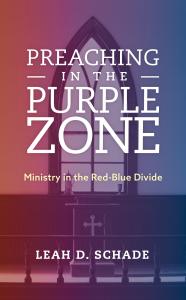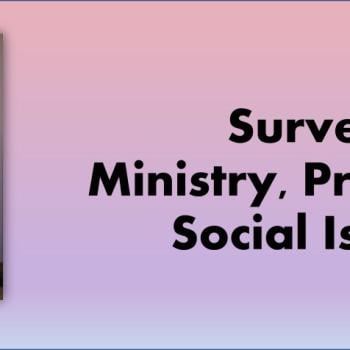In my previous posts, I introduced the “dialogical lens” for reading and interpreting scripture, then showed how to apply it to the parable of the Rich Fool in Luke Chapter 12. In these next two posts you’ll see examples of how the dialogical lens for preaching about the parable (Luke 12:13-21) can be used. Rather than the whole sermon, you’ll see a general trajectory for how the sermons are taking shape.

As a reminder, here are the 6 steps for using the dialogical lens. [To learn more, check out Chapter Four of my book Preaching in the Purple Zone: Ministry in the Red-Blue Divide (Rowman & Littlefield, 2019). Also see the previous post.]
Six Steps for Using the Dialogical Lens
- Point out the dialogical aspects of the passage.
- Determine what’s at stake.
- Identify the values.
- Explain how God, Jesus, and/or the Holy Spirit is active.
- Recognize what the dialogue is teaching us.
- Suggest possible next steps.
Sermon Trajectory #1 – Owning Stuff or Stuff Owning Us?
Jonathan Stufft is the Pastoral Intern at St. Paul Lutheran Church in Mansfield, Ohio. He’s a student in the ELCA’s TEEM program (Theological Education for Emerging Ministries). We worked on his sermon using the dialogical lens and the questions I posed to him about this passage which you can read about here.
Jonathan knows that some folks in his congregation are facing the difficult process of downsizing and moving to retirement facilities (or supporting family members who were doing this). But he also knows how difficult it can be to have open and honest conversations about our struggles with money and possessions, especially in church.
So he’s seeing the parable of the Rich Fool as an opportunity to open the door to authentic dialogue within his congregation about what it means to own and store up “stuff.” He’s using an example of a man who has amassed a vast store of collectibles to explore how and why our stuff becomes meaningful for us, but also how it can be a barrier to a life of faith and trust in God.
Point out the dialogical aspects of the passage.
Jonathan begins the sermon explaining the backstory of the parable of the Rich Fool in the gospel. He explains who Jesus has been talking with – Pharisees who have been trying to trip him up and “the crowd” gathered to witness the spectacle. He then provides some background about Hebrew family inheritance law as context for the man asking Jesus to intervene in a family dispute about inheritance. Jonathan also points out Jesus’ refusal to be triangulated, but that he continues to engage the man using the parable.
Determine what’s at stake.
At this point, Jonathan says, “Jesus’ parable of the Rich Fool warns against the dangers of not just owning possessions but being owned by your possessions. The rich man thinks that if he just stores up enough stuff, he will be able to relax and enjoy life. Jesus says that this isn’t the case.”
He also highlights an interesting aspect of the Greek text, noting that one way to read verse 20 is, “In this night your soul they demand from you.” He goes on to explore the ways in which our possessions demand our souls of us.
Identify the values.
Jonathan’s central illustration is about a man anguished about having to give up his vast store of collectibles because he must move into a small cottage in a retirement village. He talks about what these collectibles mean, what they represent, and why the man has put so much time, effort, and money into amassing them. But, he observes, “I think he felt a bit like the rich man in the parable. He had stored treasures beyond what he needed. And they were all owning him in many different ways.”
Explain how God, Jesus, and/or the Holy Spirit is active.
The pivot comes when Jonathan points out how the man’s family members and friends from church engage him in honest conversation about what his possessions mean, and how he might see the value of giving them to people who are important to him. Or having them sold and giving the money to a charity whose work is aligns with his values.
In this way, he goes from the overwhelming sense that every single thing he owned was of value to be guarded and protected to “a clarifying process that was far less about the stuff and far more about people.” Jonathan then frames this as God’s action, working through the man’s community, working on the man’s heart, to transform his attitude, help him release what was gripping him, and enter into a phase of generosity that strengthened his relationships and community.
Recognize what the dialogue is teaching us.
Jonathan uses the example of dialogue in the scripture passage and the dialogue between the man and his friends and family to invite dialogue in his own church. He points out that “We put on ‘church face’ and pretend, like those pharisees and lawyers, that we are doing everything right. That we are not struggling. That we are not challenged and we have it under control. My guess though, is that we are all struggling with money and possessions in some way.”
So he asks if the church can be a place where “we can come to be real? To share our struggles? To voice our concerns? Without judgment or criticism. Without fear. What if?”
Suggest possible next steps.
The sermon concludes by envisioning what it might look like for their church to have these conversations that are equal parts accountability and relational nurturing. Jonathan notes that the story of the rich fool is an open-ended parable. “We don’t get to hear the way things went for the rich man. It’s by design. It is less about the conclusion, than it is about the process.” He invites his listeners into that process together as a community of Christ.
In the next post, we’ll look at a second sermon trajectory that focuses on the larger social and policy implications of this parable.

Leah D. Schade is the Assistant Professor of Preaching and Worship at Lexington Theological Seminary in Kentucky. She is the author of Preaching in the Purple Zone: Ministry in the Red-Blue Divide (Rowman & Littlefield, 2019) and Creation-Crisis Preaching: Ecology, Theology, and the Pulpit (Chalice Press, 2015).
Twitter: @LeahSchade
Facebook: https://www.facebook.com/LeahDSchade/
Read also:
Using a ‘Dialogical Lens’ for Scripture and Preaching
Applying the Dialogical Lens to the Parable of the Rich Fool
Preaching Across Divides: Purple Zone Strategies for Pulpit and Public Square














